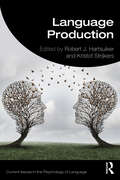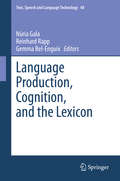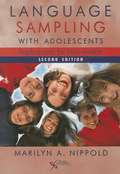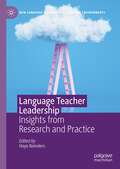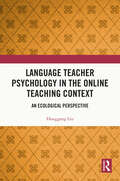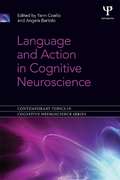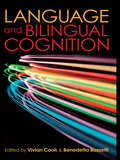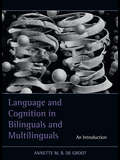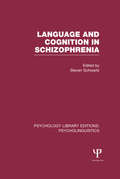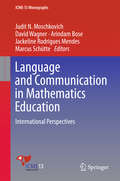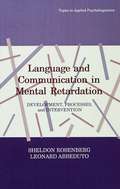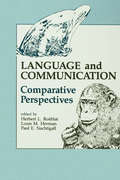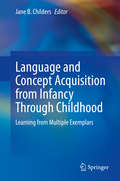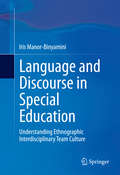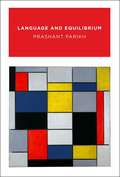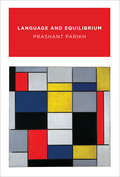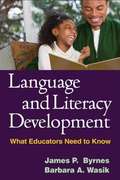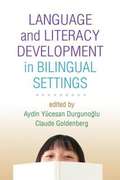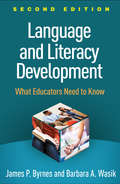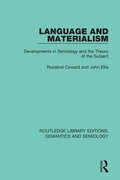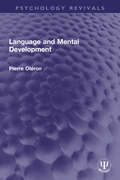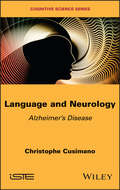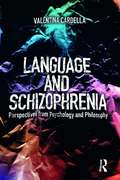- Table View
- List View
Language Production (Current Issues in the Psychology of Language)
by Robert J. Hartsuiker Kristof StrijkersBringing together the latest research from world-leading academics, this edited volume is an authoritative resource on the psycholinguistic study of language production, exploring longstanding concepts as well as contemporary and emerging theories. Hartsuiker and Strijkers affirm that although language production may seem like a mundane everyday activity, it is in fact a remarkable human accomplishment. This comprehensive text presents an up-to-date overview of the key topics in the field, providing important theoretical and empirical challenges to the traditional and accepted modal view of language production. Each chapter explores in detail a different aspect of language production, covering traditional methods including written and signed production alongside emerging research on joint action production. Emphasizing the neurobiological underpinnings of language, chapter authors showcase research that moves from a monologue-only approach to one that that considers production in more ecologically valid circumstances. Written in an accessible and compelling style, Language Production is essential reading for students and researchers of language production and psycholinguistics, as well as anyone who wishes to learn more about the fascinating topic of how humans produce language.
Language Production, Cognition, and the Lexicon
by Reinhard Rapp Núria Gala Gemma Bel-EnguixThe book collects contributions from well-established researchers at the interface between language and cognition. It provides an overview of the latest insights into this interdisciplinary field from the perspectives of natural language processing, computer science, psycholinguistics and cognitive science. One of the pioneers in cognitive natural language processing is Michael Zock, to whom this volume is dedicated. The structure of the book reflects his main research interests: lexicon and lexical analysis, semantics, language and speech generation, reading and writing technologies, language resources and language engineering. The book is a valuable reference work and authoritative information source, giving an overview on the field and describing the state of the art as well as future developments. It is intended for researchers and advanced students interested in the subject. One of the pioneers in cognitive natural language processing is Michael Zock, to whom this volume is dedicated. The structure of the book reflects his main research interests: Lexicon and lexical analysis, semantics, language and speech generation, reading and writing technologies, language resources and language engineering. The book is a valuable reference work and authoritative information source, giving an overview on the field and describing the state of the art as well as future developments. It is intended for researchers and advanced students interested in the subject. One of the pioneers in cognitive natural language processing is Michael Zock, to whom this volume is dedicated. The structure of the book reflects his main research interests: Lexicon and lexical analysis, semantics, language and speech generation, reading and writing technologies, language resources and language engineering. The book is a valuable reference work and authoritative information source, giving an overview on the field and describing the state of the art as well as future developments. It is intended for researchers and advanced students interested in the subject.
Language Sampling with Adolescents: Implications for Intervention (Second Edition)
by Marilyn A. Nippold<p>Language Sampling with Adolescents: Implications for Intervention, now in its second edition, provides guidelines for analyzing spoken and written language production in adolescents. It is geared toward graduate students and speech-language pathologists who work in the public schools with middle school and high school students (Grades 5-12). The book includes many tables, figures, and practical exercises (with answer keys) to help readers understand how to analyze the content and structure of what adolescents express in different genres: conversational, narrative, expository, and persuasive. Based on formal analyses, the book indicates how the information can be applied to establish functional language goals for adolescents with language disorders. It also explains how to implement intervention activities that are designed to enhance spoken and written language production in adolescents. <p>For the second edition, the author has revised and updated the content and added a new chapter on "Adolescent Language Disorders" that includes information on specific language impairment, nonspecific language impairment, and autism spectrum disorder. </p>
Language Teacher Leadership: Insights from Research and Practice (New Language Learning and Teaching Environments)
by Hayo ReindersThis edited book brings together an international cast of contributors and chapters which recognise the complexity of teacher leadership and its situated and dynamic nature. Chapters in this book are research-driven, and each reports on findings from (teacher-led and otherwise) research, synthesising the current state-of-the-art in each area. Each chapter uses illustrations of relevant practices from which lessons can be drawn. The aim is to come to a broad understanding of what best practices have emerged over the years, and where gaps still remain. Each of the chapters contributes to our understanding of how the different elements that make up teacher leadership are interconnected, with the concluding chapter synthesising these into a framework of language teacher leadership. This book will be of interest to pre-service and in-service teachers in the context of a professional learning community, as well as students and scholars of Applied Linguistics, Language Teaching and Learning, and Teacher Education.
Language Teacher Psychology in the Online Teaching Context: An Ecological Perspective
by Honggang LiuEmploying a mixed-method approach, the book investigates the psychology of English as a Foreign Language (EFL) teachers in the online teaching environment in China during the COVID-19 pandemic.Specifically, questionnaires were conducted on Chinese EFL teachers to explore the profiles of EFL teachers’ anxiety, self-efficacy, buoyancy and engagement. Additionally, semi-structured interviews were used to demystify their psychological growth in the dynamic interaction with ecological environments, thus constructing an ecological model of EFL teacher psychology in online teaching. The book provides new insights into EFL teacher psychology and theoretical references for building a functional ecosystem for the professional development of EFL teachers.The book will be of interest to researchers in teacher psychology, language teachers and practitioners, especially those working in the complex technology-based educational environment, and policy makers in foreign language education.
Language and Action in Cognitive Neuroscience (Contemporary Topics in Cognitive Neuroscience)
by Yann Coello Angela BartoloThis book collates the most up to date evidence from behavioural, brain imagery and stroke-patient studies, to discuss the ways in which cognitive and neural processes are responsible for language processing. Divided into six sections, the edited volume presents arguments from evolutionist, developmental, behavioural and neurobiological perspectives, all of which point to a strong relationship between action and language. It provides a scientific basis for a new theoretical approach to language evolution, acquisition and use in humans, whilst at the same time assessing current debates on motor system’s contribution to the emergence of language acquisition, perception and production. The chapters have been written by internationally acknowledged researchers from a variety of disciplines, and as such this book will be of great interest to academics, students and professionals in the areas of cognitive psychology, neuropsychology, neuroscience, psycholinguistics and philosophy.
Language and Bilingual Cognition
by Vivian CookThis innovative volume provides a state-of-the-art overview of the relationship between language and cognition with a focus on bilinguals. It brings together contributions from international leading figures in various disciplines and showcases contemporary research on the emerging area of bilingual cognition. The first part of the volume discusses the relationship between language and cognition as studied in various disciplines, from psychology to philosophy to anthropology to linguistics, with chapters written by some of the major thinkers in each discipline. The second part concerns language and cognition in bilinguals. Following an introductory overview and contributions from established figures in the field, bilingual cognition researchers provide examples of their latest research on topics including time, space, motion, colors, and emotion. The third part discusses practical applications of the idea of bilingual cognition, such as marketing and translation. The volume is essential reading for researchers and postgraduate students with an interest in language and cognition, or in bilingualism and second languages.
Language and Cognition in Bilinguals and Multilinguals: An Introduction
by Annette M.B. de GrootPsycholinguistics – the field of science that examines the mental processes and knowledge structures involved in the acquisition, comprehension, and production of language – had a strong monolingual orientation during the first four decades following its emergence around 1950. The awareness that a large part of mankind speaks more than one language – that this may impact both on the way each individual language is used and on the thought processes of bilinguals and multilinguals, and that, consequently, our theories on human linguistic ability and its role in non-linguistic cognition are incomplete and, perhaps, false – has led to a steep growth of studies on bilingualism and multilingualism since around 1995. This textbook introduces the reader to the field of study that examines language acquisition, comprehension and production from the perspective of the bilingual and multilingual speaker. It furthermore provides an introduction to studies that investigate the implications of being bilingual on various aspects of non-linguistic cognition. The major topics covered are the development of language in children growing up in a bilingual environment either from birth or relatively soon after, late foreign language learning, and word recognition, sentence comprehension, speech production, and translation processes in bilinguals. Furthermore, the ability of bilinguals and multilinguals to generally produce language in the "intended" language is discussed, as is the cognitive machinery that enables this. Finally, the consequences of bilingualism and multilingualism for non-linguistic cognition and findings and views regarding the biological basis of bilingualism and multilingualism are presented. The textbook’s primary readership are students and researchers in Cognitive Psychology, Linguistics, and Applied Linguistics, but teachers of language and translators and interpreters who wish to become better informed on the cognitive and biological basis of bilingualism and multilingualism will also benefit from it.
Language and Cognition in Schizophrenia: Psycholinguistics: Language And Cognition In Schizophrenia (Psychology Library Editions: Psycholinguistics)
by Steven SchwartzOriginally published in 1978, the contributors to this volume, including the leading figures in experimental psychopathology, were largely concerned with deducing the behaviour of schizophrenics from general psychological theories of language, learning and cognition. Their emphasis on deduction reflected a modern reliance on laboratory experimentation, and, taken as a whole, the chapters cover the breadth and variety of current approaches of the time to the study of schizophrenic language and cognition. The first part of the volume is concerned with recent developments in the study of schizophrenic language. The second part deals with various aspects of schizophrenic cognition. The final chapter, by the editor, attempts to review and integrate what was currently known about schizophrenic cognition and language. This chapter contrasts the various experimental methodologies used to validate theories by pointing out areas of agreement and disagreement as well as possible directions for future theory and research. Here is a book that at the time presented the most up-to-date overview available on language and thought in schizophrenia. Today it can be read and enjoyed in its historical context.
Language and Communication in Mathematics Education: International Perspectives (ICME-13 Monographs)
by David Wagner Judit N. Moschkovich Arindam Bose Jackeline Rodrigues Mendes Marcus SchütteThis book considers some of the outstanding questions regarding language and communication in the teaching and learning of mathematics – an established theme in mathematics education research, which is growing in prominence. Recent research has demonstrated the wide range of theoretical and methodological resources that can contribute to this area of study, including those drawing on cross-disciplinary perspectives influenced by, among others, sociology, psychology, linguistics, and semiotics. Examining language in its broadest sense to include all modes of communication, including visual and gestural as well as spoken and written modes, it features work presented and discussed in the Language and Communication topic study group (TSG 31) at the 13th International Congress on Mathematical Education (ICME-13). A joint session with participants of the Mathematics Education in a Multilingual and Multicultural Environment topic study group (TSG 32) enhanced discussions, which are incorporated in elaborations included in this book. Discussing cross-cutting topics it appeals to readers from a wide range of disciplines, such as mathematics education and research methods in education, multilingualism, applied linguistics and beyond.
Language and Communication in Mental Retardation: Development, Processes, and intervention (Topics in Applied Psycholinguistics Series #Volume 27)
by Sheldon Rosenberg Leonard AbbedutoResearch on language and communication development and intervention in persons with mental retardation has been conducted at a fast and furious pace during the last two decades. Past attempts to summarize this research have been rather restricted, focusing on a single, narrowly defined substantive domain such as lexical development, or of a single etiology such as Down Syndrome. This volume, in contrast, presents a critical, integrative review of research and theory on language development and processing across all domains and a variety of etiologies. In addition, many previous attempts to review portions of this research have failed to consider the research within the context of current theory and data from developmental psycholinguistics and linguistics. A major contribution of this book is the emphasis on relevant work outside of mental retardation for understanding and treating the language and communication problems of persons with mental retardation. Finally, this book is comprehensive and up-to-date across all the areas of language covered including appropriate introductory material in linguistics and psychology -- discussions of the innateness, cognition-first and motherese views of normal language acquisition. In addition, the authors' extensive bibliography is valuable in and of itself to any serious student or professional in the area.
Language and Communication: Comparative Perspectives (Comparative Cognition and Neuroscience Series)
by Paul E. Nachtigall Herbert L. Roitblat Louis M. HermanThe result of a conference on language and related cognitive processes in animals, this book brings together scientists working on language and communication, reviews research done on language in apes and dolphins, and places this work in a larger perspective of animal communication and cognition. The conference convened an international group of distinguished scientists interested in exploring the neurological, cognitive, social, and behavioral aspects of communication in animals. A broad spectrum of perspectives was represented, including naturalistic investigations of animals in their natural habitat as well as strictly controlled laboratory investigations. Similarly, a broad range of species was described including rats, parrots, monkeys, apes, dolphins, and humans.New methodologies and perspectives are continuously emerging that allow consideration of issues that previously could not be resolved. Emerging technology such as video equipment and advanced database systems allow one to exhaustively record in an accessible format the evidence on which scientific conclusions must be based. Investigation of animal language and communication is a small, but vigorously exciting area of scientific investigation as the chapters in this volume clearly attest.
Language and Complex Systems
by William A. Kretzschmar Jr.An understanding of language as a complex system helps us to think differently about linguistics, and helps us to address the impact of linguistic interaction. This book demonstrates how the science of complex systems changes every area of linguistics: how to make a grammar, how to think about the history of language, how language works in the brain, and how it works in social settings. Kretzschmar argues that to construct the best grammars of languages it is necessary to understand the complex system of speech. Each chapter makes specific recommendations for how linguists should manage empirical data in order to form better generalizations about a language and its varieties. The book will be welcomed by students and scholars working in linguistics and English language, especially the study of language variation and the historical development of English.
Language and Concept Acquisition from Infancy Through Childhood: Learning from Multiple Exemplars
by Jane B. ChildersThis book examines the role of experience-based learning on children’s acquisition of language and concepts. It reviews, compares, and contrasts accounts of how the opportunity to recognize and generalize patterns influences learning. The book offers the first systematic integration of three highly influential research traditions in the domains of language and concept acquisition: Statistical Learning, Structural Alignment, and the Bayesian learning perspective. Chapters examine the parameters that constrain learning, address conditions that optimize learning, and offer explanations for cases in which implicit exemplar-based learning fails to occur. By exploring both the benefits and challenges children face as they learn from multiple examples, the book offers insight on how to better able to understand children’s early unsupervised learning about language and concepts. Topics featured in this book include:Competing models of statistical learning and how learning might be constrained by infants’ developing cognitive abilities.How experience with multiple exemplars helps infants understand space and other relations.The emergence of category-based inductive reasoning during infancy and early childhood.How children learn individual verbs and the verb system over time. How statistical learning leads to aggregation and abstraction in word learning.Mechanisms for evaluating others’ reliability as sources of knowledge when learning new words.The Search for Invariance (SI) hypothesis and its role in facilitating causal learning. Language and Concept Acquisition from Infancy Through Childhood is an essential resource for researchers, clinicians and related professionals, and graduate students in infancy and early child development, applied linguistics, language education, child, school, and developmental psychology and related mental health and education services.
Language and Discourse in Special Education
by Iris Manor-BinyaminiThis book examines the words and discourse as well as their meaning and impact on the everyday culture of a multidisciplinary team at a school for students with mental disabilities. The book examines the organizational, social, professional, and emotional experiences of team members from such disciplines as child and school psychology, special education, therapy (e. g. , occupational, speech), social work, and pediatric medicine within a special education school. It explores the ways in which team members describe and interpret the day-to-day requirements of working effectively in a special education school, using their own language and discourse from a subjective point of view. In addition, the book analyzes and interprets the influence of language and discourse on the outlook, behavior patterns, and the coping of team members working in the school with the students, among themselves as a team, and with the difficulties and dilemmas that concern them as well the solutions that they themselves introduce for all these issues. This book, with its focus on the unique and complex work environment of the multidisciplinary special education team, is essential reading for researchers, professionals, and graduate students in child and school psychology, therapeutic disciplines (e. g. , occupational, speech), social work, pediatric medicine, and allied mental health and medical fields.
Language and Equilibrium
by Prashant ParikhIn Language and Equilibrium, Prashant Parikh offers a new account of meaning for natural language. He argues that equilibrium, or balance among multiple interacting forces, is a key attribute of language and meaning and shows how to derive the meaning of an utterance from first principles by modeling it as a system of interdependent games. His account results in a novel view of semantics and pragmatics and describes how both may be integrated with syntax. It considers many aspects of meaning--including literal meaning and implicature--and advances a detailed theory of definite descriptions as an application of the framework. Language and Equilibrium is intended for a wide readership in the cognitive sciences, including philosophers, linguists, and artificial intelligence researchers as well as neuroscientists, psychologists, and economists interested in language and communication.
Language and Equilibrium
by Prashant ParikhA new framework that shows how to derive the meaning of an utterance from first principles by modeling it as a system of interdependent games. In Language and Equilibrium, Prashant Parikh offers a new account of meaning for natural language. He argues that equilibrium, or balance among multiple interacting forces, is a key attribute of language and meaning and shows how to derive the meaning of an utterance from first principles by modeling it as a system of interdependent games.His account results in a novel view of semantics and pragmatics and describes how both may be integrated with syntax. It considers many aspects of meaning—including literal meaning and implicature—and advances a detailed theory of definite descriptions as an application of the framework. Language and Equilibrium is intended for a wide readership in the cognitive sciences, including philosophers, linguists, and artificial intelligence researchers as well as neuroscientists, psychologists, and economists interested in language and communication.
Language and Literacy Development
by James A. Wasik James P. ByrnesChildren's speaking, reading, and writing skills are closely connected, and this engaging text guides preservice and practicing teachers in choosing instructional strategies that promote the integrated development of these skills. The authors explore the foundations of language in the developing brain and show how language acquisition in early childhood influences later literacy and language use. Chapters cover phonological skills, vocabulary, grammatical knowledge, comprehension, and writing, as well as instructional techniques and programs. The book examines why some students struggle with particular language and literacy tasks and how motivation and sociocultural factors affect proficiency. Rich classroom vignettes and examples of effective teaching strategies are accompanied by accessible explanations of relevant research.
Language and Literacy Development in Bilingual Settings
by Claude Goldenberg Aydin DurgunogluGrounded in state-of-the-art research, this book explores how English language learners develop both the oral language and literacy skills necessary for school success. Chapters examine the cognitive bases of English acquisition, and how the process is different for children from alphabetic (such as Spanish) and nonalphabetic (such as Chinese) language backgrounds. The book addresses a key challenge facing educators and clinicians identifying students whose poor English skills may indicate an underlying impairment, as opposed to still-developing language proficiency. Implications for diagnosis, intervention, and instruction are highlighted throughout.
Language and Literacy Development, Second Edition: What Educators Need to Know
by James P. Byrnes Barbara A. WasikThis established text--now revised and updated--reveals how spoken language skills are acquired and how they affect children’s later reading and writing achievement. With a unique focus on the needs of educators, the book examines the foundations of language in the developing brain. It explores the relationship of language processes to core literacy skills and probes the impact of motivational and sociocultural factors on children’s learning. Implications of developmental knowledge for classroom instruction are highlighted, and effective practices reviewed. Revealing vignettes, clear explanations of research, and lists of “main ideas” enhance the text’s accessibility for preservice teachers. New to This Edition *Chapter on emergent literacy and the predictors of reading success. *Incorporates the latest research, including findings from key longitudinal studies. *Increased attention to English learners, low-income children, and children with disabilities. *Updated and expanded topics, including usage-based theories of language acquisition, morphological knowledge in vocabulary and comprehension, phonological processing skills, and writing development.
Language and Materialism: Developments in Semiology and the Theory of the Subject (Routledge Library Editions: Semantics and Semiology #5)
by John Ellis Rosalind CowardFirst published in 1977, this book presents a comprehensive and lucid guide through the labyrinths of semiology and structuralism — perhaps the most significant systems of study to have been developed in the twentieth century. The authors describe the early presuppositions of structuralism and semiology which claim to be a materialist theory of language based on Saussure’s notion of the sign. They show how these presuppositions have been challenged by work following Althusser’s development of the Marxist theory of ideology, and by Lacan’s re-reading of Freud. The book explains how the encounter of two disciplines — psychoanalysis and Marxism — on the ground of their common problem —language — has produced a new understanding of society and its subjects. It produces a critical re-examination of the traditional Marxist theory of ideology, together with the concepts of sign and identity of the subject.
Language and Mental Development (Psychology Revivals)
by Pierre OléronOriginally published in 1977, this book considers the role language plays in psychological development. It tries to avoid general discussions of "language and thought", an approach already sufficiently developed by philosophers and (although somewhat less) by psychologists. Instead it attempts to focus specifically upon what we can learn about the topic from available research findings at the time. Theoretical considerations are developed only when necessary to clarify an issue or to facilitate the integration of presented material. The aim of the work is simple – to share with the reader the author’s thoughts and understanding of available knowledge of the role of language in mental development.
Language and Mind
by Noam ChomskyThis is the third edition of Chomsky's outstanding collection of essays on language and mind, first published in 2006. The first six chapters, originally published in the 1960s, made a groundbreaking contribution to linguistic theory. This edition complements them with an additional chapter and a new preface, bringing Chomsky's influential approach into the twenty-first century. Chapters 1-6 present Chomsky's early work on the nature and acquisition of language as a genetically endowed, biological system (Universal Grammar), through the rules and principles of which we acquire an internalized knowledge (I-language). Over the past fifty years, this framework has sparked an explosion of inquiry into a wide range of languages, and has yielded some major theoretical questions. The final chapter revisits the key issues, reviewing the 'biolinguistic' approach that has guided Chomsky's work from its origins to the present day, and raising some novel and exciting challenges for the study of language and mind.
Language and Neurology: Alzheimer's Disease
by Christophe CusimanoThis book questions the relationship and compatibility between current beliefs in neurology and contemporary textual linguistic theories, interpretative semantics and discourse analysis. It begins with a critical examination of the screenings for Alzheimer's type dementia through cognitive testing, particularly screenings where language is used. It then analyzes the various linguistic properties (morphological, syntactic and semantic) of the speech of Alzheimer's patients, which can be troubling for both caregivers and their environment in general. More than a synthesis of critical linguistic reflections, Language and Neurology provokes a fruitful reflection through adjustments suggested by the acquired knowledge of textual semantics.
Language and Schizophrenia: Perspectives from Psychology and Philosophy
by Valentina CardellaSchizophrenia is one of the most enigmatic mental disorders, and language is one of its most essential and distinctive traits. Language and Schizophrenia provides a complete overview of schizophrenic language, utilising both psychological and philosophical perspectives to explore the unique way language impacts on this mental disorder. Language and Schizophrenia investigates specific features of schizophrenic language using cognitive psychology alongside the opposing field of phenomenological psychiatry, concluding that neither of these approaches fully succeeds in explaining the linguistic features unique to Schizophrenia. Cardella’s innovative approach of combining psychological perspectives with philosophy offers a direct alternative to traditional cognitive perspectives, emphasising the fundamental role that language plays in the disorder. This book provides a thorough analysis of the deep link between language and schizophrenia and will be of great value to researchers and postgraduates studying schizophrenia, phenomenology, neuropsychology and philosophy of language.
